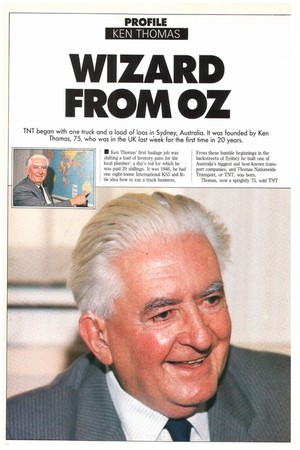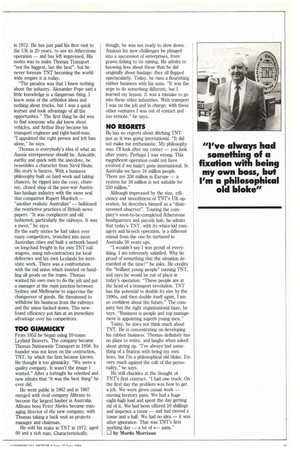WIZARD FROM OZ
Page 48

Page 49

If you've noticed an error in this article please click here to report it so we can fix it.
TNT began with one truck and a load of loos in Sydney, Australia. It was founded by Ken Thomas, 75, who was in the UK last week for the first time in 20 years.
• Ken Thomas' first haulage job was shifting a load of lavatory pans for the local plumber: a day's toil for which he was paid 20 shillings. It was 1946, he had one eight-tonne International KS5 and little idea how to run a truck business. From these humble beginnings in the backstreets of Sydney he built one of Australia's biggest and best-known transport companies, and Thomas Nationwide Transport, or TNT, was born.
Thomas, now a sprightly 75, sold TNT in 1972. He has just paid his first visit to the UK in 20 years, to see its Atherstone operation — and has left impressed. His motto was to make Thomas Transport "not the biggest, but the best", but he never foresaw TNT becoming the worldwide empire it is today.
"The paradox was that I knew nothing about the industry. Alexander Pope said a little knowledge is a dangerous thing. I knew none of the orthodox ideas and nothing about trucks, but I was a quick learner and took advantage of all the opportunites." The first thing he did was to find someone who did know about vehicles, and Arthur Bray became his transport engineer and right-hand-man. "I appointed the right person and left him alone," he says.
Thomas is everybody's idea of what an Aussie entrepreneur should be. Amicable, earthy and quick with the anecdote, he resembles a character from Nevil Shute. His story is bizarre. With a business philosophy built on hard work and taking chances, he ripped into the cosy, chummy, closed shop of the post-war Australian haulage industry with the same zeal that compatriot Rupert Murdoch — "another realistic Australian" — bulldozed the restrictive practices of British newspapers. "It was complacent and old fashioned, particularly the railways. It was a mess," he says.
By the early sixties he had taken over many competitors, branched into most Australian cities and built a network based on long-haul freight in his own TNT railwagons, using sub-contractors for local deliveries and his own Leylands for interstate work. There was a confrontation with the rail union which insisted on handling all goods on the trains. Thomas wanted his own men to do the job and put a manager at the main junction between Sydney and Melbourne to supervise the changeover of goods. He threatened to withdraw his business from the railways and the union backed down. This newfound efficiency put him at an immediate advantage over his competitors.
TOO GIMMICKY
From 1953 he began using 10-tonne Leyland Beavers. The company became Thomas Nationwide Transport in 1958. Its founder was not keen on the contraction, TNT, by which the firm became known. He thought it too gimmicky. "We were a quality company. It wasn't the image I wanted." After a fortnight he relented and now admits that "it was the best thing" he ever did.
He went public in 1962 and in 1967 merged with rival company Alltrans to become the largest haulier in Australia. Alltrans boss Peter Abeles became managing director of the new company, with Thomas taking a back seat as projects manager and chairman.
He sold his stake in TNT in 1972, aged 60 and a rich man. Characteristically,
though, he was not ready to slow down. Anxious for new challenges he plunged into a succession of enterprises, from prawn fishing to tin mining. He admits to knowing less about these than he did originally about haulage: they all flopped spectacularly. Today, he runs a flourishing rubber business with his sons. "It was the urge to do something different, but I learned my lesson. It was a mistake to go into these other industries. With transport I was on the job and in charge; with these other ventures I was out of contact and too remote," he says.
NO REGRETS
He has no regrets about ditching TNT just as it was going international. "It did not make me enthusiastic. My philosophy was: look after my corner — you look after yours. Perhaps I was wrong. This magnificent operation could not have evolved if we hadn't gone international. In Australia we have 16 million people. There are 330 million in Europe — a system for 16 million is not suitable for 330 million."
Although impressed by the size, efficiency and smoothness of TNT's UK operation, he describes himself as a "disinterested observer". Touring the company's soon-to-be-completed Atherstone headquarters and parcels hub, he admits that today's TNT, with its whizz-kid managers and hi-tech operation, is a different animal from the one he nurtured in Australia 30 years ago.
"I wouldn't say I was proud of everything. I am extremely satisfied. Why be proud of something that the situation demanded at the time?" he asks. He credits the "brilliant young people" running TNT, and says he would be out of place in today's operation. "These people are at the head of a transport revolution. TNT has the potential to double its size by the 1990s, and then double itself again, I am so confident about the future." The company has the right organisational base, he says. "Business is people and top management is appointing superb young men."
Today, he does not think much about TNT. He is concentrating on developing his rubber business. Thomas definitely has no plans to retire, and laughs when asked about giving up. "I've always had something of a fixation with being my own boss, but I'm a philosophical old bloke. I'm very much against the cult of the personality," he says.
He still chuckles at the thought of TNT's first contract. "I had one truck. On the first day the problem was how to get a job. We were given casual work — moving lavatory pans. We had a huge eight-high load and spent the day getting rid of it. We had been offered 10 shillings and sixpence a tonne — and had moved a tonne and a half. We had no idea — it was utter ignorance. That was TNT's first working day — a lot of s--pans." 0 by Murdo Morrison
















































































































